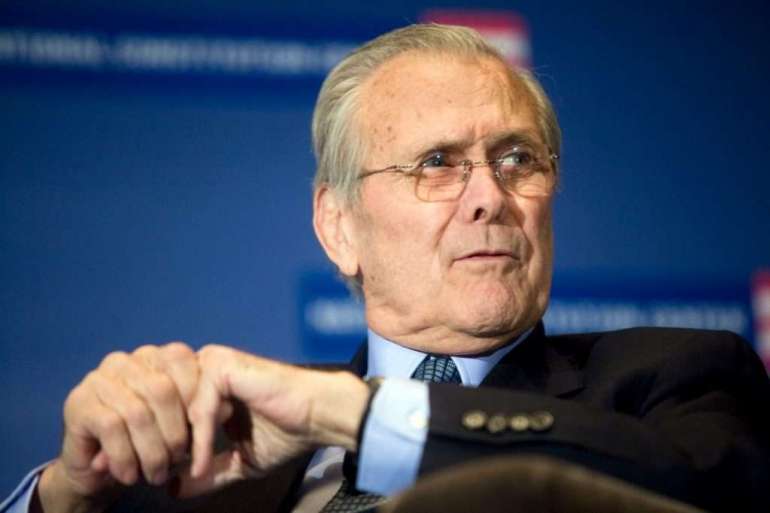Former Defense Secretary Donald Rumsfeld dies at 88

Rumsfeld held the distinction of serving two nonconsecutive terms as head of the Defense Department, first under President Gerald Ford and then, a quarter-century later, under President George W. Bush.
After entering the Pentagon in 2001 with ambitious plans to change how the military does business and develop new weapons systems incorporating emerging commercial technologies, Rumsfeld was instead forced to pivot to managing the grinding insurgencies in Iraq and Afghanistan. That often uncoordinated effort led to a string of disasters — including U.S. forces torturing prisoners at Abu Ghraib, and mounting casualties to underequipped U.S. troops — that resulted in his firing in 2006.
Rumsfeld graduated from Princeton University in 1954 with a degree in political science and went on to serve in the Navy for three years. The Illinois native launched a campaign for Congress in Illinois’ 13th Congressional District, winning in 1962 at the age of 30 and getting reelected three times. He was a leading co-sponsor of the Freedom of Information Act.
He served under several presidents, starting with Richard Nixon. He was appointed to the Office of Economic Opportunity in 1969, then served as counselor to the president. He also headed Nixon’s Economic Stabilization Program before being appointed as ambassador to NATO.
In 1974, after Nixon’s resignation, Rumsfeld returned to Washington to serve as Ford’s chief of staff. When Ford later appointed him secretary of defense, Rumsfeld recruited Dick Cheney, his young former staffer and a staunch ally, to take over the White House role.
As the secretary of defense who, after the terrorist attacks of Sept. 11, 2001, oversaw the push into Afghanistan and Iraq, Rumsfeld didn’t live to see the end of either war. The last U.S. troops aren’t expected to leave Afghanistan until later this summer, and several thousand remain in Iraq with no end in sight.
Those wars are only now winding down for U.S. forces two decades later, with the last American troops expected to leave Afghanistan by early July — just days after his passing. In total, 4,400 U.S. forces were killed in Iraq and another 32,000 wounded, with 2,200 dead and 21,000 wounded in Afghanistan.
The irony is that Rumsfeld sought to limit the size of both wars by looking for ways to conduct them cheaply and quickly, a push that had long-term disastrous effects as U.S. forces struggled to understand the enemy and develop effective plans to counter the clearly growing insurgencies.
From the early days of planning for the invasion of Iraq and continuing years into the fight, Rumsfeld rejected suggestions that the country could turn into a long, grinding counterinsurgency fight. During regular combative Pentagon news conferences, he famously quipped that “stuff happens” when Baghdad descended into chaos after the dictator Saddam Hussein fell, and years later he still refused to call local fighters “insurgents.”
Rumsfeld even dismissed the rise of roadside bombs that were tearing through poorly armed American Humvees and killing scores of Americans.
“As you know, you go to war with the army you have, not the army you might want or wish to have at a later time,” he said in 2004. “You can have all the armor in the world on a tank, and a tank can be blown up. And you can have an up-armored Humvee, and it can be blown up.”
A consummate Washington insider, Rumsfeld was adept at playing the bureaucracy, and at the Pentagon he became infamous for issuing hundreds of “snowflakes,” short directives and memos across the department that contained everything from direct orders to musings on press conference etiquette and complaints that career officials were slowing him down.
He walked in the front door of the Pentagon with his eyes firmly fixed on what he envisioned would be a historical modernization of the department, and a sweeping upgrade of the weapons the military takes into combat. But the Sept. 11 attacks and the beginning of two wars — only now ending for U.S. troops — frustrated his ambitions.
As defense secretary from 2001 until his firing in 2006 in the wake of a disastrous midterm election for the Republicans, Rumsfeld also pushed billions of dollars into military modernization projects — many of which ended up flaming out after investing in unproven ideas.
The abuse of Iraqi prisoners at Abu Ghraib and Guantanamo Bay in Cuba were among some of the most consequential controversies of his tenure.